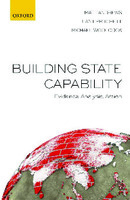Building State Capability: Evidence, Analysis, Action
| dc.contributor.author | Andrews, Matt | |
| dc.contributor.author | Pritchett, Lant | |
| dc.contributor.author | Woolcock, Michael | |
| dc.date.accessioned | 2017-02-24 23:55 | |
| dc.date.accessioned | 2018-10-03 09:09:28 | |
| dc.date.accessioned | 2020-04-01T13:51:37Z | |
| dc.date.available | 2020-04-01T13:51:37Z | |
| dc.date.issued | 2017 | |
| dc.identifier | 624551 | |
| dc.identifier | OCN: 976483623 | en_US |
| dc.identifier.uri | http://library.oapen.org/handle/20.500.12657/31857 | |
| dc.description.abstract | Governments play a major role in the development process, and constantly introduce reforms and policies to achieve developmental objectives. Many of these interventions have limited impact, however; schools get built but kids don’t learn, IT systems are introduced but not used, plans are written but not implemented. These achievement deficiencies reveal gaps in capabilities, and weaknesses in the process of building state capability. This book addresses these weaknesses and gaps. It starts by providing evidence of the capability shortfalls that currently exist in many countries, showing that many governments lack basic capacities even after decades of reforms and capacity-building efforts. The book then analyzes this evidence, identifying capability traps that hold many governments back—particularly related to isomorphic mimicry (where governments copy best practice solutions from other countries that make them look more capable even if they are not more capable) and premature load bearing (where governments adopt new mechanisms that they cannot actually make work, given weak extant capacities). The book then describes a process that governments can use to escape these capability traps. Called PDIA (problem-driven iterative adaptation), this process empowers people working in governments to find and fit solutions to the problems they face. The discussion about this process is structured in a practical manner so that readers can actually apply tools and ideas to the capability challenges they face in their own contexts. These applications will help readers devise policies and reforms that have more impact than those of the past. | |
| dc.language | English | |
| dc.subject.classification | thema EDItEUR::J Society and Social Sciences::JP Politics and government::JPQ Central / national / federal government::JPQB Central / national / federal government policies | en_US |
| dc.subject.classification | thema EDItEUR::K Economics, Finance, Business and Management::KC Economics::KCM Development economics and emerging economies | en_US |
| dc.subject.classification | thema EDItEUR::K Economics, Finance, Business and Management::KC Economics::KCP Political economy | en_US |
| dc.subject.other | foreign aid | |
| dc.subject.other | reform | |
| dc.subject.other | policy | |
| dc.subject.other | government | |
| dc.subject.other | politics | |
| dc.subject.other | capability | |
| dc.subject.other | development | |
| dc.subject.other | poverty | |
| dc.subject.other | pdia | |
| dc.subject.other | services | |
| dc.subject.other | Accountability | |
| dc.title | Building State Capability: Evidence, Analysis, Action | |
| dc.type | book | |
| oapen.identifier.doi | 10.1093/acprof:oso/9780198747482.001.0001 | |
| oapen.relation.isPublishedBy | b9501915-cdee-4f2a-8030-9c0b187854b2 | |
| oapen.relation.isFundedBy | 5b8f8357-4e82-466a-b29d-e58dc1800698 | |
| oapen.relation.isbn | 9780198747482 | |
| oapen.pages | 288 | |
| oapen.place.publication | Oxford, UK | |
| oapen.remark.public | Relevant Wikipedia pages: Accountability - https://en.wikipedia.org/wiki/Accountability; Developing country - https://en.wikipedia.org/wiki/Developing_country | |
| oapen.identifier.ocn | 976483623 |

